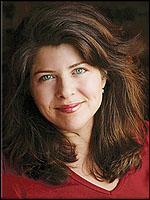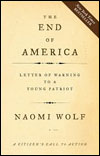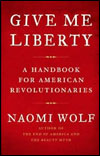Hey Young America, Here’s a Text For You by Naomi Wolf

Naomi Wolf was born in San Francisco in 1962. She was an undergraduate at Yale University and did her graduate work at New College, Oxford University as a Rhodes Scholar.
Her essays have appeared in various publications including: The New Republic, Wall Street Journal, Glamour, Ms., Esquire, The Washington Post, and The New York Times. She also speaks widely to groups across the country.
The Beauty Myth, her first book, was an international bestseller. She followed that with Fire With Fire: The New Female Power and How It Will Change The 21st Century, published by Random House in 1993, and Promiscuities: The Secret Struggle for Womanhood, published in 1997. Misconceptions, released in 2001, is a powerful and passionate critique of pregnancy and birth in America. In 2002, Harper Collins published a 10th anniversary commemorative edition of The Beauty Myth.
Naomi Wolf is the author of The End of America: A Letter of Warning to a Young Patriot and the Forthcoming Give me Liberty: A Handbook for American Revolutionaries.
Naomi Wolf is co-founder of the Board of The Woodhull Institute for Ethical Leadership, an organization devoted to training young women in ethical leadership for the 21st century. The institute teaches professional development in the arts and media, politics and law, business and entrepreneurship as well as ethical decision making.
Her most recent book, a New York Times bestseller, is The End of America: Letter of Warning to a Young Patriot, published in 2007 by Chelsea Green.
Naomi Wolf, for me, exists as a courageous voice in a world full of tentative passion. I appreciate the unapologetic stand that she takes as a patriot; as someone who cares deeply about America and about the world that we will one day leave behind.
Sunday, November 25, 2007
Is America still America if millions of us no longer know how democracy works?
When I speak on college campuses, I find that students are either baffled by democracy's workings or that they don't see any point in engaging in the democratic process. Sometimes both.
Not long ago, I gave a talk at a major university in the Midwest. "They're going to raze our meadows and put in a shopping mall!" a young woman in the audience wailed. "And there's nothing we can do!" she said, to the nods of young and old alike.
I stared at her in amazement and asked how old she was. When she said 26, I suggested that she run for city council. Then she stared at me-- with complete incomprehension. It took me a long time to convince her and her peers in the audience that what I'd suggested was possible, even if she didn't have money, a major media outlet of her own or a political "machine" behind her.
NAOMI WOLF ON AMERICA
The End of America: Letters of Warning to a Young Patriot

Winner of the 2008 NAUTILUS SILVER AWARD in the category of Social Change/Activism.
An impassioned call to action to Americans from all walks of life to restore the checks and balances and our time-honored protections against abuses of power outlined by our Founding Fathers.
In a stunning indictment of the Bush administration and Congress, best-selling author Naomi Wolf lays out her case for saving American democracy.
Click here to learn more and buy The End of America.
____________________
Give Me Liberty: A Handbook for American Revolutionaries
As the practice of democracy becomes a lost art, Americans are increasingly desperate for a restored nation. Many have a general sense that the "system" is in disorder -- if not on the road to functional collapse. But though it is easy to identify our political problems, the solutions are not always as clear. In Give Me Liberty: A Handbook for American Revolutionaries, bestselling author Naomi Wolf illustrates the breathtaking changes that can take place when ordinary citizens engage in the democratic system the way the founders intended and tells how to use that system, right now, to change your life, your community, and ultimately, the nation.
Click here to learn more and buy Give Me Liberty: A Handbook for American Revolutionaries.
This lack of understanding about how democracy works is disturbing enough. But at a time when our system of government is under assault from an administration that ignores traditional checks and balances, engages in illegal wiretapping and writes secret laws on torture, it means that we're facing an unprecedented crisis.
As the Founders knew, if citizens are ignorant of or complacent about the proper workings of a republic "of laws not of men," then any leader of any party -- or any tyrannical Congress or even a tyrannical majority -- can abuse the power they hold. But at this moment of threat to the system the Framers set in place, a third of young Americans don't really understand what they were up to.
According to a recent study by the National Center for Education Statistics, only 47 percent of high school seniors have mastered a minimum level of U.S. history and civics, while only 14 percent performed at or above the "proficient" level. Middle schoolers in many states are no longer required to take classes in civics or government. Only 29 states require high school students to take a government or civics course, leaving millions of young Americans in the dark about why democracy matters.
A survey released by the Intercollegiate Studies Institute in September found that U.S. high school students missed almost half the questions on a civic literacy test. Only 45.9 percent of those surveyed knew that the sentence "We hold these truths to be self-evident, that all men are created equal" is in the Declaration of Independence. Yet these same students can probably name the winner of "American Idol" in a heartbeat.
The study also found that the more students increase their civic knowledge during college, the more likely they are to vote and engage in other civic activities. And vice versa -- civic illiteracy equals civic inaction.
Here are some actual quotes from otherwise smart, well-meaning young Americans:
"I show my true convictions by refusing to vote."
"The two parties are exactly the same."
"Congress is bought and paid for."
"Elections are just a front for corporations."
"My teacher says you shouldn't believe anything you read in the newspapers at all," a 16-year-old from affluent Menlo Park, Calif., told me last week.
Even those who are politically engaged don't have much faith in our system's potential. "I was taught that it's set up for the elites and for old white men and that there's not much you can do about it," said Christopher Le, 28, who works at a suicide hotline in Austin. Le's mother was a "boat person" who fled Vietnam with her 4-month-old son so that he could be raised in freedom. But few Americans in the under-30 set have her kind of faith in the United States. As Le put it, "No one taught us that democracy was this shining, inspiring thing."
The United States has been blessed with more than 200 years of a strong democracy, so it's easy to yield to a comforting -- and lazy -- conviction that it's magically self-sustaining and doesn't need to be defended, an idea that would have horrified the Founders, who knew that our democracy would be a fragile thing.
In recent years, the trend away from teaching democracy to young Americans has been at least partly a consequence of the trend of teaching to the standardized tests introduced by the Bush administration. Mandated by the federal No Child Left Behind Act, the tests assess chiefly math and reading comprehension. Basic civics and history have suffered. As a result, teenagers and young adults often have no clue why the United States is different from, say, Egypt or Russia; they have little idea what liberty is.
Few young Americans understand that the Second Amendment keeps their homes safe from the kind of government intrusion that other citizens suffer around the world; few realize that "due process" means that they can't be locked up in a dungeon by the state and left to languish indefinitely.
This dangerous ignorance is confirmed by the Knight Foundation, which has found an alarming decline in student support for the First Amendment. In a 2004 survey, more than a third of the student respondents thought that the First Amendment went too far in guaranteeing freedom of speech and of the press. By 2006, the number who held that view had swelled to half.
In the absence of strong civics training and in the presence of a "war on terror" that insistently portrays freedom and checks and balances as threats to national security, the Constitution and the Bill of Rights have become controversial for today's young people.
But this distressing situation isn't just George W. Bush's fault. Young Americans have also inherited some strains of thought from the left that have undermined their awareness of and respect for democracy. When New Left activists of the 1960s started the antiwar and free speech student movements, they didn't get their intellectual framework from Montesquieu or Thomas Paine: They looked to Marx, Lenin and Mao. It became fashionable to employ Marxist ways of thinking about social change: not "reform" but "dialectic"; not "citizen engagement" but "ideological correctness"; not working for change but "fighting the man."
During the Vietnam War, the left further weakened itself by abandoning the notion of patriotism. Young antiwar leaders burned the flag instead of invoking the ideals of the republic it represents. By turning their backs on the idea of patriotism -- and even on the brave men who were fighting the unpopular war -- the left abandoned the field to the right to "brand" patriotism as it own, often in a way that means uncritical support for anything the executive branch decides to do.
In the Reagan era, when the Iran-contra scandal showed a disregard for the rule of law, college students were preoccupied with the fashionable theories of post-structuralism and deconstructionism, critical language and psychoanalytic theories developed by French philosophers Jacques Lacan and Jacques Derrida that were often applied to the political world, with disastrous consequences. These theories were often presented to students as an argument that the state -- even in the United States -- is only a network of power structures. This also helped confine to the attic of unfashionable ideas the notion that the state could be a platform for freedom; so much for the fusty old Rights of Man.
In the 1990s and the early years of this century, theories that globalization is the ultimate evil found their ascendancy on college campuses. Young people, informed by movements against sweatshops and the World Trade Organization, have come to see democracy as a mere cosmetic gloss on the rapacious monolith of global capitalism.
All of these legacies have left the young feeling depressed, cynical and powerless. And yet our democracy needs them more than ever now. Young people are always in the vanguard of any movement to sustain or advance liberty. Students led the charge for freedom in Prague and Mexico City in 1968, in Chile in 1973, in Beijing and throughout Eastern Europe in 1989.
Young people helped lead the way in the U.S. civil rights movement, white college students joining with African Americans to sign up voters in the Freedom Summer of 1964. The feminist movement was revived after half a century of dormancy by a cadre of young, idealistic and politically savvy women. Same for the antiwar movement: Abbie Hoffman, Rennie Davis and Tom Hayden of the Chicago Seven were ages 17 to 22 when they were charged with conspiracy and inciting to riot while protesting at the 1968 Democratic National Convention in Chicago.
When I ask young people today whether they've been taught that immense positive changes have come about because small groups of people engaged in democratic practices, many look at me with puzzlement. They need a crash course in democracy -- and a crash course in how easy it is to close down an open society if steps are taken such as those we see our government taking now.
Earlier this year, I helped co-found the American Freedom Campaign to call for a national democracy movement to restore the rule of law. In response, some citizens called a national strike this month on behalf of the Constitution. It was a shaky beginning -- people showed up with their flags and their petitions, but the groups were sparse and shy and out of practice. In New York's Union Square, the sound system failed to carry one new young freedom activist's reading of the Bill of Rights very far. And yet it didn't matter. "For the first time in a long time," said Barbara Martinez as the wind whipped her scarf, "I feel hopeful."
